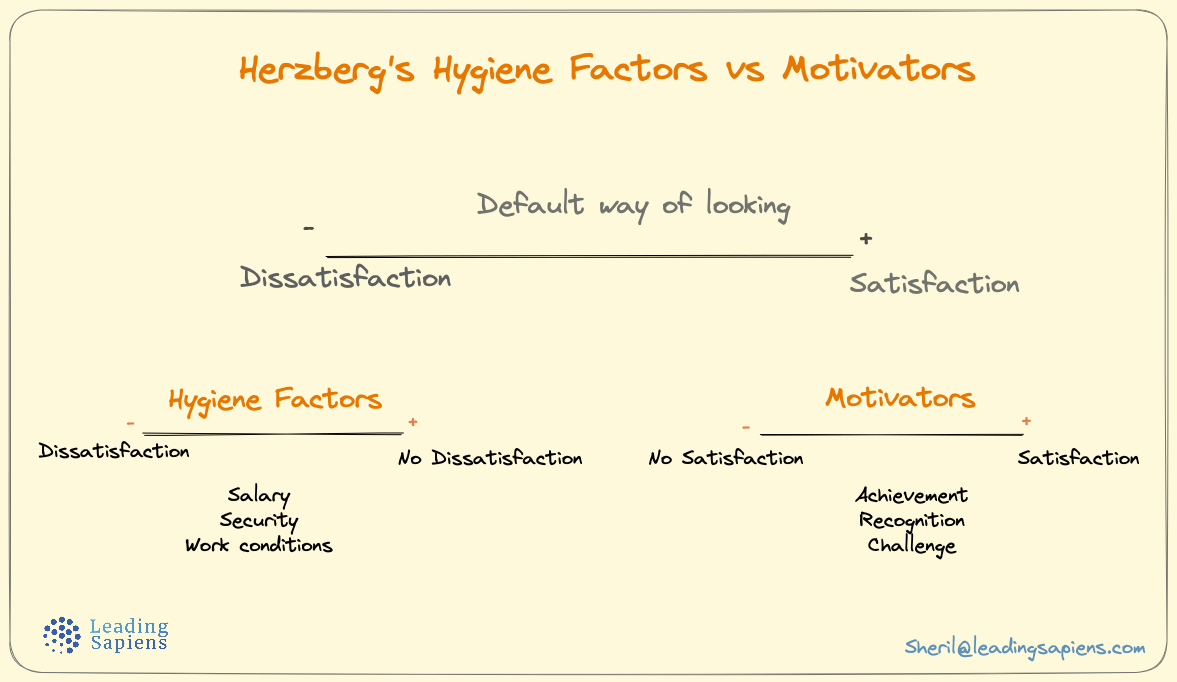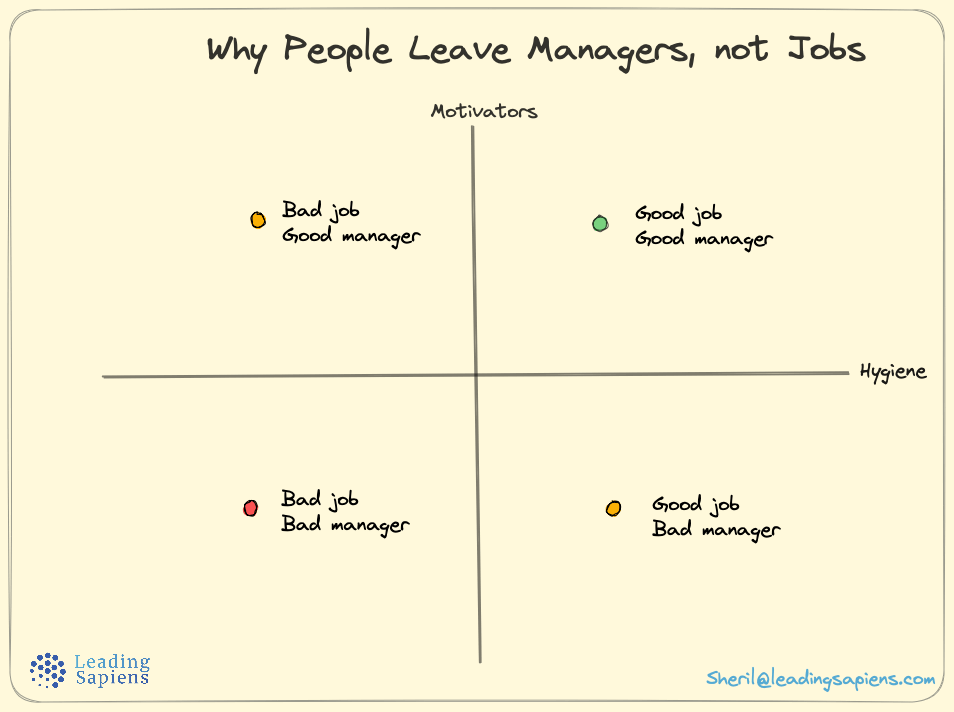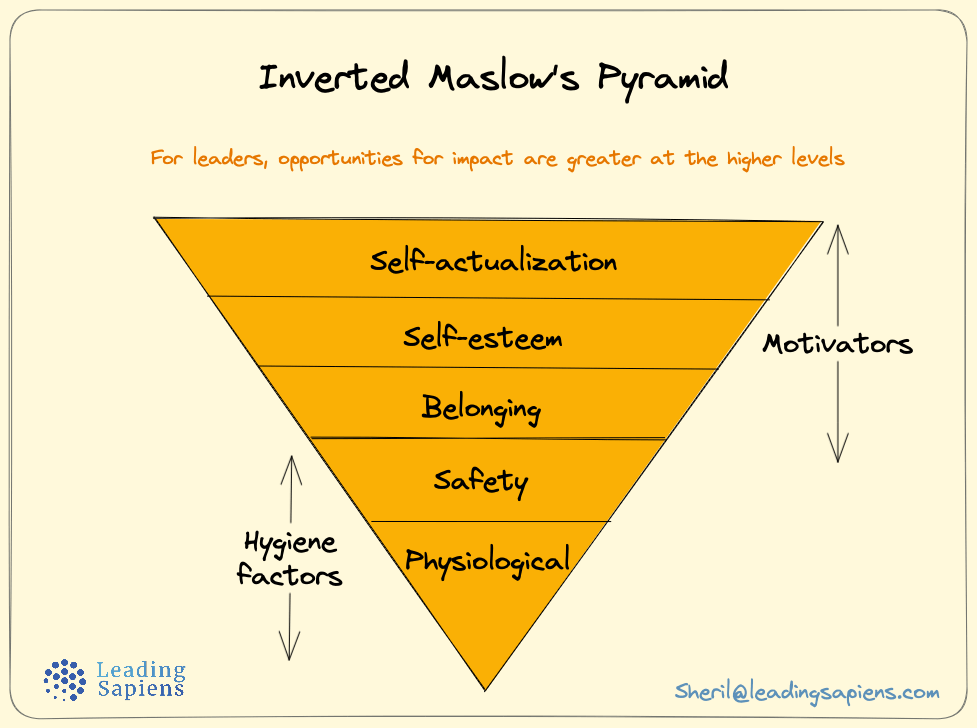How true is the statement that "people leave managers, not jobs"? Should you prioritize compensation, or is it team cohesion you should focus on? These are challenges leaders face daily. In modern workplaces, confusion still abounds around the impact of money on motivation, and how to balance it with other factors.
Frederick Herzberg’s two-factor theory of hygiene factors vs motivators, or what he calls satisfiers vs dissatisfiers, is a basic but useful tool. His model, while not providing all the answers, helps clear at least some confusion, and highlights limitations of each approach.
Herzberg’s hygiene factors vs motivators
The standard way of understanding engagement at work is to look at satisfaction and dissatisfaction as polar opposites.
Herzberg’s key finding was that factors which satisfy and those that dissatisfy are not opposites, but rather a different set. In his research, the themes of stories about satisfaction were not the same as those about dissatisfaction.
Thus satisfaction and dissatisfaction arise from very different factors.
He proposed two separate dimensions — motivators and hygiene factors — each with a positive and negative emotional end. He argued that factors for satisfaction and dissatisfaction are qualitatively different.

Thus the opposing poles become:
- Satisfaction and no satisfaction (Motivators/Satisfiers )
- Dissatisfaction and no dissatisfaction (Hygiene factors/Dissatisfiers )
It's a subtle but important distinction — it means pumping up hygiene factors doesn't necessarily lead to increased satisfaction and performance, but maintains a minimum standard.
Motivators are what's required to increase satisfaction. However, they won't work without a baseline of hygiene factors already in place. Thus hygiene factors form the solid ground upon which motivation factors can be built upon.
Hygiene factors
These are also known as dissatisfiers. They prevent dissatisfaction, and include company policies and administration, salary, working conditions, interpersonal relationships, status, and security. They tend to be extrinsic, and essentially form the environment and context of the work.
Job dissatisfaction is often linked to unfair company policies, incompetent or unfair managers, bad interpersonal relations, unpleasant working conditions, unfair salary, threats to status, and job insecurity.
They are like preventive measures that do not make people healthy but can prevent illness.
Motivators
These are also called satisfiers, and include recognition, achievement, content of the work itself, responsibility, and advancement.
His findings showed that job satisfaction is often linked to achievement, recognition, interesting work, increased responsibility, advancement, and learning. These tend to be intrinsic, and are key aspects of the content of the job.
They meet the psychological needs of recognition, sense of achievement, opportunities for growth, and meaning at work.
Ask workers what makes them unhappy at work, and you’ll hear about an annoying boss, a low salary, an uncomfortable work space, or stupid rules. Managed badly, environmental factors make people miserable, and they can certainly be de-motivating.
But even if managed brilliantly, they don’t motivate anybody to work much harder or smarter. People are motivated, instead, by interesting work, challenge, and increased responsibility. These intrinsic factors answer people’s deep-seated need for growth and achievement.
— Frederick Herzberg
How to enhance motivators
Herzberg coined the term “job enrichment” and gave suggestions for the “ingredients of a good job”:
- Direct and immediate performance feedback
- Opportunities for increasing ownership, and accountability
- Learning that develops new skills, knowledge, and expertise
- Control over schedule
- Involvement in decisions about organizational resources
- Removing hierarchical barriers to allow better communication and collaboration
- Career advancement to take on new challenges and responsibilities.
There's more awareness around these compared to when Herzberg was writing. But it’s still a good back to basics list. His recommendations are also consistent with those in Deci and Ryan’s self-determination theory that highlights the importance of autonomy, competence, and relatedness.
Limitations and dangers of hygiene factors
Money can be a hygiene factor if not high enough, and also a motivator when tied to recognition and achievement.
But the problem with hygiene factors is what Herzberg called “zero escaping point”— they have decreasing marginal utility beyond a certain point.
Once we reach a new high of hygiene factors, we get used to them, and need ever increasing quantities to have the same effect. Positive psychology calls this “hedonic adaption”, or the more visual term of “satisfaction treadmill”. [2]
There is nothing wrong with providing the maximum of hygienic benefits to the employee. The benefits should be as great as the society can afford.
... What is in error is the summation of human needs in totally hygienic terms.
...
Idleness, indifference and irresponsibility are healthy responses to absurd work.
...
If you want people motivated to do a good job, give them a good job to do.
– Frederick Herzberg
Hygiene factors can decrease or prevent dissatisfaction more effectively, rather than increase satisfaction. You need motivation factors to increase satisfaction and engagement.
Herzberg cautions against using hygiene factors exclusively:
- Don’t expect people to be excited about boring jobs as boredom is the normal and healthy reaction to such jobs.
- Hygiene needs escalate, and people demand increasing amounts of money, perks, and status to remain motivated.
- People may become more interested in hygiene factors and believe that they can find satisfaction by pursuing them exclusively
Peter Drucker recognized the double-edged sword aspect of compensation turning into hygiene factors:
...while the ability of the economic reward to provide a positive incentive diminishes, its capacity to create dissatisfaction, if disappointed, rapidly increases.
We have known for 50 years that money alone does not motivate to perform. Dissatisfaction with money grossly demotivates. Satisfaction with money is, however, mainly a ‘hygiene factor'.
In the more recent Drive, Daniel Pink differentiates between baseline, "if-then", and "now-that" rewards:
Baseline rewards: Salary, contract payments, benefits, and a few perks that represent the floor for compensation. If someone's baseline rewards aren't adequate or equitable, her focus will be on the unfairness of her situation or the anxiety of her circumstance, making motivation of any sort extremely difficult.
...
If-then rewards: Rewards offered as contingencies as in, If you do this, then you'll get that. For routine tasks, if-then rewards can sometimes be effective. For creative, conceptual tasks, they invariably do more harm than good.
...
Now that rewards: Rewards offered after a task has been completed as in Now that you've done such a great job, let's acknowledge the achievement. Now that rewards, while tricky, are less perilous for nonroutine tasks than if-then rewards.
Why people leave managers, not jobs
It’s worth noting that hygiene factors, often, are not directly under the influence of the manager. Managers tend to have more influence in motivation factors. This might explain the common trope of people leaving managers, not jobs.
The best teachers can make even a boring subject endlessly interesting. While the worst, make even the most interesting subjects, boring.
Similarly, a good manager can make a bad job bearable. But a bad manager can make even the best job unbearable.

Herzberg’s model clearly has links with Maslow’s hierarchy of needs — hygiene factors map to the lower-level needs, while motivators address higher-order ones.
From a manager’s perspective, they have more direct control in the upper parts of the pyramid. Thus, for leaders, in terms of opportunities for impact, the triangle should be inverted — more on top, and fewer at the bottom.

Leaders cannot depend exclusively on financial rewards for driving performance. Herzberg's motivators are equally important, even more so.
At the same time, no amount of motivators will help without the right hygiene factors in place. For a manager, the job then is to minimize dissatisfiers, while maximizing satisfiers.
📚 HBR 100 Best Reads: You also get a curated spreadsheet of the best articles Harvard Business Review has ever published. Spans 70 years, comes complete with categories and short summaries.
Related reading
Herzberg was ahead of his time when he published his findings in 1959. But even today, organizations are behind in terms of really understanding what makes people tick. We still operate in early 20th century factory paradigms. Managers have to understand the basics of what I call the Human OS, if they are serious about performance.


Sources
- Herzberg, F., Mausner, B., Bloch-Snydermann, B. (1959) The Motivation to Work.
- Sachau, D. A. (2007). Resurrecting the Motivation-Hygiene Theory: Herzberg and the Positive Psychology Movement. Human Resource Development Review, 6(4), 377–393. https://doi.org/10.1177/1534484307307546
- Herzberg, F. (1968) ‘One More Time: How do you Motivate Employees?’ Harvard Business Review
- Management: Tasks, Responsibilities, Practices by Peter Drucker
- The Essential Drucker by Peter Drucker
- Drive by Daniel Pink



